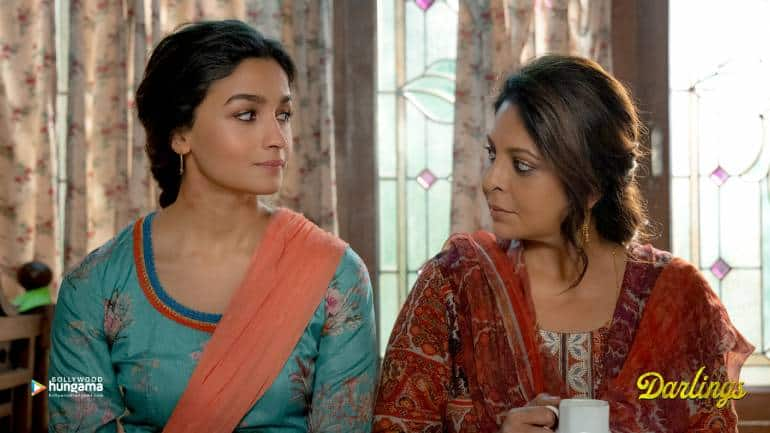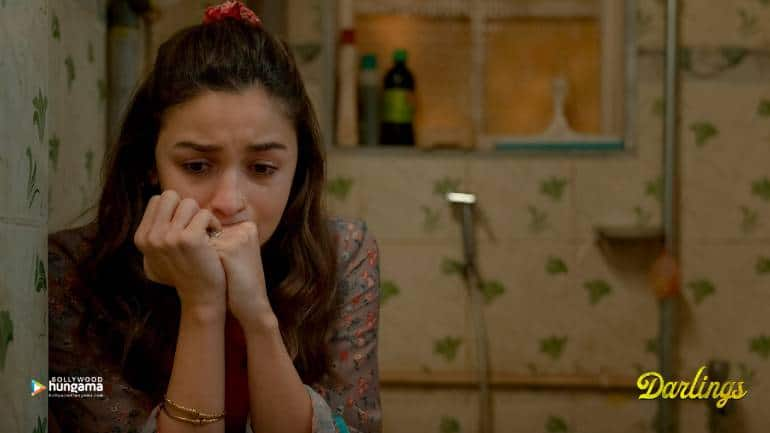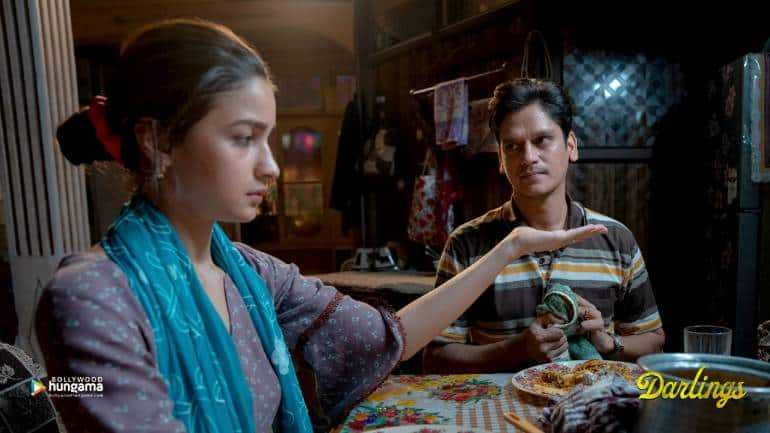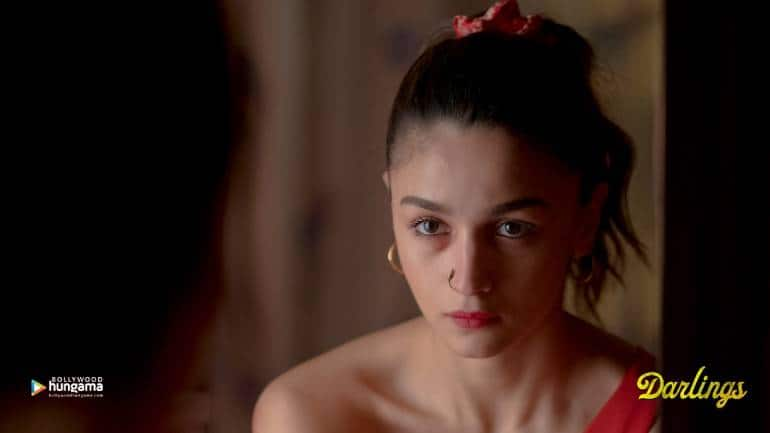



Movies in which bonds between women are central to the story are still terribly uncommon in our content universe. So the premise of Jasmeet K. Reen’s Darlings—a mother-daughter duo taking drastic measures against the serial abuser husband of the daughter—already places it firmly in an unfamiliar or unconventional orbit of storytelling. That is just one of the film’s winning indexes. The fact that it has been directed and co-written by a woman makes its gaze on gender, power, class and community immersively and stoutly feminine.
Darlings is about escaping, however fantastically, the agonizing constraints of gender. The lives of most women in Hindi movies end with a wedding. Even its proponents would hardly argue that the aim of marriage is to set women free. Reen’s screenplay, co-written by Parveez Shaikh (with dialogues by them and Vijay Maurya), subverts that easy resolution entirely, and says the exact opposite, a truth uncomfortably close to real life: That the only way to escape emotional and physical enslavement is to end a marriage, not try to change it.

The screenplay’s double-edged form, transitioning from intensely dark and realistic portrayal of a marriage that pivots around the man’s abuse and the woman’s optimism that things will change between them, to a darkly comical tale of revenge has some jarring notes. But overall, what this transition facilitates is make the two Darlings, Shamshunissa and Badrunissa, wickedly and abidingly human.
It drops on Netflix today—a great addition to Netflix India’s original slate, in need of resuscitation.
Alia Bhatt plays Badru, a virtuoso of suffering in the first half. The film is set in an imaginary chawl in Mumbai called Barha chawl, largely populated by Muslims. With her wide eyes and light frame, Badru projects both naïve vulnerability and a reserve of stubborn optimism.
Her husband Hamza (Vijay Varma) is a government employee with thwarted dreams, also in an inescapable circle of abuse from his boss, Damle (Kiran Karmarkar). He is the butt of everybody’s jokes in the office, an outsider in every sense in a workplace where the staff appears to be overwhelmingly Hindu. The politics of class and religion is a subtle backdrop.
Badru’s mother Shamsu (Shefali Shah), who lives in the same chawl, is an aspiring home chef and inhabits a world all of her own, where the lines between wickedness and cynicism are blurred, and her overwhelming love for her daughter is her biggest source of sustenance.
Hamza is an alcoholic who turns violent when drunk—a staple character ubiquitous across class, religion, nations and cultures. His punching-bag mechanism to deal with his own resentments with “saali kismat” is to subject his wife to terrifying physical brutality. Shamshu is constantly nudging her daughter to get rid of her husband—she suggests rat poison with a nonchalance that makes you wonder if she is just a woman embittered by her own husband who went missing long ago or if she is plain whacko. Shamshu is a riveting character.
When her suffering reaches its lowest point, Badru has a change of heart. She will take her revenge. In this sometimes too far-fetched and sometimes hilariously thrilling project, Badru’s allies are of course her mother who is all too pleased at her daughter’s change of heart and Zulfi (Roshan Matthew), a young man in the neighbourhood who is seen around Shamshu a lot. He is her partner in her budding cooking business and also in teaching the necessary lesson to Hamza.

Vijay Maurya plays a bumbling police officer who oozes false confidence and a sense of authority, and is easily manipulated by the two women to their advantage. Will Badru get her revenge, and what kind of a revenge will it be—a cold, swift riddance or slow-burn torture?
The abrupt character transition of Badru has enough script logic for it to be believable but still, the change in character, form, even genre feels vexing at first. Some of the plot developments are glaringly melodramatic, culminating in an end that is nearly not as satisfying as all the action that has preceded it. But then again, the writers introduce another twist which shifts the psychological centre of gravity of this mother-daughter relationship to another tragic trajectory.
The second part is a universe managed, if not exactly ruled, by the two women. Reen adopts a style that is at once restrained and outrageous. The violence continues unabated, the victim-turning-perpetrator trope delightfully subverted. Easy labels like feminist don’t serve the film’s tone and skill on display including performance, writing and attention to details.

Darlings ultimately is a triumph of storytelling rather than messaging—the women’s purported misandry isn’t the point; the more sardonic the moments, the more it moves away from genre or politics. Through it all, the metaphor for this battle is a story of a trusting front who is stung by a scorpion. “I am a scorpion, and stinging is what I do.”
The frog and the scorpion are either Hamza or Badru, depending on where the story is. The sad-funny scenes have a sweep that shows and says a lot more without spelling anything out. When the police inspector accuses Badru of conniving with Zulfi to make her husband disappear because the police suspects Badru and Zulfi to be having an affair, Shamshu looks him straight in the eye—and the camera shifts to make it seem like Shamshu is really talking to her audience—and says, “My daughter is an Indian woman. And an Indian woman never lays eyes on another person as long as her husband is alive. What do you call it, sati-savitri, right sir?” Her Muslim-ness, her being a woman and her transcending these identities coalesce in this simple dialogue—there are a few such delightfully sardonic moments in the screenplay.
The film derives its force mostly from the performances of the three lead characters. Varma, as the man driving all the mayhem in the story, channels the chillingly twisted Hamza with captivating details of body language as well as intelligence. His reign of physical and psychological terror is difficult to forget long after you have finished watching the film.

By now, we are accustomed to Bhatt’s extraordinary ability to inhabit characters who inhabit difficult worlds and difficult corners unique to being a woman. Here, she is more mature than she has ever been before—her immersion in Badru, without any tricks or gimmicks, stands out. She plays the character’s transition in a way that no effort shows, and throughout the film retains Badru’s spirit—eternally optimistic, naive, steely and at the same time unpredictable with her emotional courage in crucial moments.
Bhatt's chemistry with Shah, an actor with a remarkable breadth of skills under her belt, including possibly the Indian actress with the most expressive set of eyes, a vehicle that never fails her, is tender and volatile at the same time. A lot of how the mother and the daughter communicate with each other and plot together is through their eyes. Shah gets Shamshu’s oddball free spirit and the layers of her personal history pat—another actor is unimaginable in this role. Like Bhatt, her acting acumen and the tricks that go with it never shows off. Bhatt and Shah are an electric duet—in speech, the writers emphasise the impossibility of these two characters existing without each other in the way Badru uses plurals: darlings, networks, shits, sads, respects, helps, etc.
Mathew’s characters Zulfi is a personification of the new-age man—comfortable in his skin without having to control or dictate others. His magnanimous yet confused spirit is enduring—a man after this mother-daughter’s heart. Mathew plays the role deftly. Zulfi’s quiet and confident masculinity is the refreshing and celebrated outlier of Darlings.
Reen’s crew has big names attached to it—Anil Mehta’s cinematography delivers a voluptuous visual palette. The music by Prashant Pillai and two innovative numbers, the title track and La Ilaaz by the star duo Gulzar-Vishal Bhardwaj which derives its originality from being off-kilter in language as well as orchestration. Combined with the dexterity of the cast, the storytelling in Darlings is enough to hold your interest till the last moment—at times, it induces a sigh-inducing uplift, and at other times, it makes you hold your breath.
Discover the latest Business News, Sensex, and Nifty updates. Obtain Personal Finance insights, tax queries, and expert opinions on Moneycontrol or download the Moneycontrol App to stay updated!
Find the best of Al News in one place, specially curated for you every weekend.
Stay on top of the latest tech trends and biggest startup news.